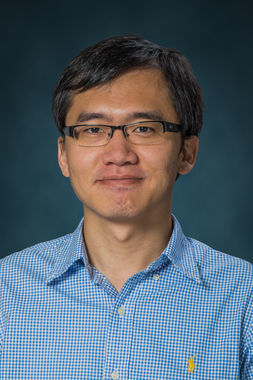 Sound waves could be the future of biomedical research, diagnosing and treatment, says Peng Li, a chemistry professor at West Virginia University.
Sound waves could be the future of biomedical research, diagnosing and treatment, says Peng Li, a chemistry professor at West Virginia University.
Li is a data analyst for an ongoing research study using an acoustic device to separate extracellular vesicles for a deeper look at their properties.
“What we are doing here matters because if we isolate these properties, people will be able to understand how they connect to diseases,” Li said.
Li is assisting a team of researchers to develop an acoustic device that uses sound waves to split cells, which could eventually assist medical professionals during diagnoses and examinations. Because the sound waves are used at a very high frequency, they cannot be heard—but the work the acoustic device is capable of could lead to breakthroughs in the future.
“Down the road, this research has the potential to be a useful mile marker to sterilize a way to isolate the cells and extracellular vesicles for diagnoses,” Li said.
Li hopes this study will allow the research team to transfer centralized tests into a form of at-home care. Many patients travel to hospitals and labs for important diagnostic tests, such as cardiac biomarkers and cancer biomarkers, because the procedures can only be conducted by medical professionals. He hopes this research will eventually lead to patients’ ability to test themselves at home and inform the results to their doctors immediately, similar to pregnancy and blood sugar tests. At-home tests would save a lot of time and money while also providing in-home healthcare for rural communities that do not have these resources readily available.
“The ability to move and manipulate objects using sound is very powerful,” said Gregory Dudley, chair of the C. Eugene Bennett Department of Chemistry. “We are pleased to have someone with Li’s expertise and vision on our faculty, and we look forward to the contributions that his research team can make in the exciting field of acoustofluidics.
Li and the research team aspire to make their acoustic device more efficient moving forward, which will help doctors diagnose and analyze cancer and neurological cases more efficiently. The team is also interested in using the device to help recreate prenatal devices to find any issues with the pregnancy faster than before.
“We are satisfied with where the research is now, but down the road we want to provide more,” Li said. “If we can provide faster results, the doctors will have an easier life because results and analysis will be found faster based on one sample, so if we want to do that we have to improve efficiency.”
Li joined the WVU Department of Chemistry in fall 2016. With research primarily focused on sound waves, microdevices and their biomedical applications, Li has recently published several journal articles discussing the topic.
To learn more about the study, visit http://www.pnas.org/content/suppl/2017/09/14/1709210114.DCSupplemental.